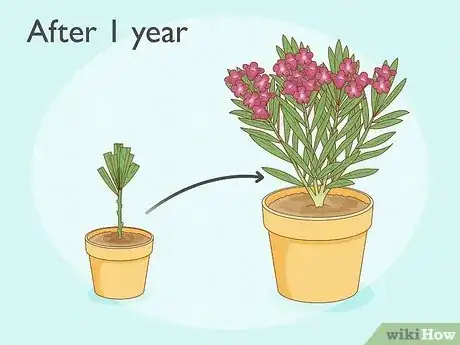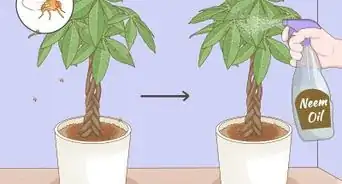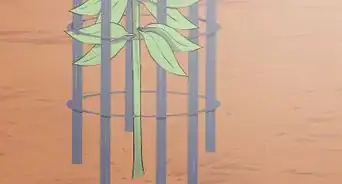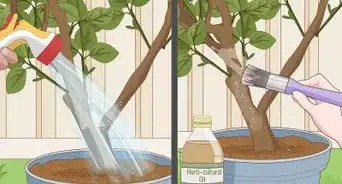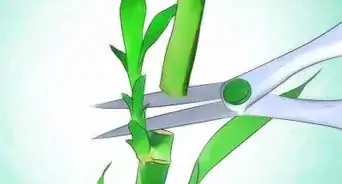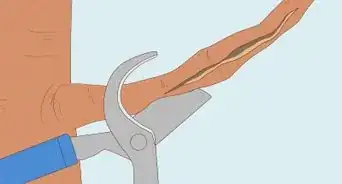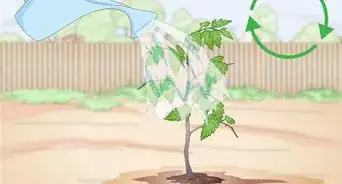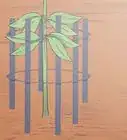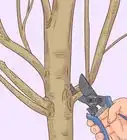wikiHow is a “wiki,” similar to Wikipedia, which means that many of our articles are co-written by multiple authors. To create this article, volunteer authors worked to edit and improve it over time.
There are 8 references cited in this article, which can be found at the bottom of the page.
wikiHow marks an article as reader-approved once it receives enough positive feedback. In this case, 100% of readers who voted found the article helpful, earning it our reader-approved status.
This article has been viewed 44,643 times.
Learn more...
Oleanders (Nerium oleander) are a species of flowering bush in the dogbane family (Apocynaceae). With a few simple steps, you can easily grow more of them.
Steps
-
1Take 4 to 6-inch tip cuttings. The cuttings should not be "busy" with leaves. There should also be no flowers or flower buds on the cutting.[1]
-
2Strip the lower (cut end) half to 2/3 of the cutting's leaves off.Advertisement
-
3Cut the remaining leaves to half length. This helps encourage root formation in the next step.[2]
-
4Get a small clear glass jar and add an inch or two of water to the bottom. Place the cut end of the cuttings in the water, and keep in a shady spot indoors.[3]
-
5Add small amounts of water to the jar as needed to replace water lost to evaporation. Just try to keep the water level about the same.
-
6In 2 - 3 weeks, rooting should occur. Early signs of rooting include the formation of a couple small bumps or bulges on the stem, just below the lowest set of leaf nodes. Once these bumps occur, rooting will occur shortly after.
-
7Once the roots reach about 1/2 to 1 inch long (this will happen very quickly once roots have started forming), plant it in a pot filled with potting mix, at about the same depth as the water line was on the cutting.
-
8Give it water right away, and keep watered, but make sure it drains well.
-
9In about a year, it will be big enough to be repotted into a gallon-size pot.[4]
-
10Continue with repotting as needed, or if you live in USDA Planting Zone 9 - 11, plant in the ground. If you live north of zone 9, keep your oleander in a pot indoors in the winter, as winter temperatures in those climates will kill it.[5]
Community Q&A
-
QuestionI have done all as prescribed, it has been two days. My cutting seems to wilt soon. What could be the reason for this?
 NinoxTop AnswererThe reason for wilting is watering. The soil must remain wet, but you don't have to water too much to help roots to develop.
NinoxTop AnswererThe reason for wilting is watering. The soil must remain wet, but you don't have to water too much to help roots to develop. -
QuestionIf frost burns the tips of the plant, what do I do?
 NinoxTop AnswererYou just need to remove dead parts of the plant. It will likely grow new branches and return to health.
NinoxTop AnswererYou just need to remove dead parts of the plant. It will likely grow new branches and return to health.
Warnings
- Oleanders are very poisonous. Do not keep them where small children and pets can access it without supervision, as the reported lethal dose has been reported as low as one leaf by ingestion.[6] If ingested, go to a hospital for treatment. Inducing vomiting has been found to be a generally ineffective means of treatment, and is therefore not recommended.[7]⧼thumbs_response⧽
References
- ↑ https://www.youtube.com/watch?v=6Nbotj9TUis
- ↑ https://www.youtube.com/watch?v=J-5MBZ_4ws8
- ↑ https://www.youtube.com/watch?v=GHh9BtjTznQ
- ↑ https://www.plantopedia.com/nerium-oleander/
- ↑ http://gardeningsolutions.ifas.ufl.edu/plants/trees-and-shrubs/shrubs/oleander.html
- ↑ https://www.webmd.com/vitamins/ai/ingredientmono-789/oleander
- ↑ https://www.ncbi.nlm.nih.gov/pmc/articles/PMC3089829/
- http://www.public.asu.edu/~camartin/plants/Plant%20html%20files/neriumoleander.html








